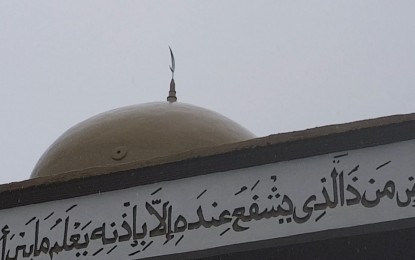
A Masjid minaret in Pantar, Lanao del Norte. (File photo by Nef Luczon)
CAGAYAN DE ORO CITY -- Ramadan is the Islamic calendar’s month of fasting, congregational prayers, and charity. But with the Covid-19 pandemic affecting communities around the world, observance for the Islamic holy month takes a different turn as cities are at a lockdown, gatherings are minimized, and quarantine is highly encouraged.
Nor-Jamal Batugan, former chairperson of this city's Muslim Youth Council who is currently training to become an alim (scholar) at Zulfi, Saudi Arabia, said Ramadan traditions this year have become muted and more personal.
“With the community quarantine on set, the observance of Ramadan has been different. Today we are offering our daily and communal prayers inside our homes," he said in an interview on Wednesday.
Originally from Marantao, Lanao del Sur, Batugan recalls the many times when Ramadan brought fond memories growing up.
“I remember sitting with my parents and siblings around the table in our kitchen as we all wait for the broadcast of the Maghrib Azan (call to sunset prayer) in the local radio, announcing that today’s fasting has finally concluded,” he said.
Batugan would spend every Thursday night with his family as fireworks lit the sky above their neighborhood.
He added: “The madrasah (Islamic school) in the front of our house would usually host a nightly Musabaqah (contest) for children who can best perform the Azan or read the Qur’an.”
Because of the current global crisis brought by the Covid-19 pandemic this year, some festivities have either been postponed indefinitely or put on hold.
Nevertheless, Batugan is reassured that the essence of Ramadan still remains.
“It has become more meaningful and spiritual,” he said. “Muslims recite and ponder over the Qur’an in solitude with lesser distraction.”
Batugan shared that although the number of attendees in the Sacred Mosques of Mecca and Medina have decreased, Muslims have found ways to offer prayers in their homes.
This month-long observance also provides an opportunity for families to offer prayers together, and more time for Muslims to reflect Ramadan’s primary message.
“Tarawih (nightly prayers) are read and offered inside our homes and Iftar (meals after sunset) are shared by families,” Batugan said.
The current atmosphere also resonates with former Muslim Youth Council chairman Khalid Bashier who shares that this year’s Ramadan observance has witnessed a change in tradition due to the COVID-19 crisis.
“It affects many of us (Muslims) a lot,” Bashier said. He points out that the observance of Ramadan has always been complete with congregational prayers mostly held in mosques.
“Mosques play a very important role in the Muslim’s life,” he quipped. “It is where we gather five times a day and perform our prayers. We don’t feel complete without the mosques.”
But because of the city's current general community quarantine, the communal observance has been put on hold.
Still, Bashier finds solace amidst the crisis.
“This Ramadan [may be] a different experience compared to the previous ones, but I’m spending it to study the literary style of Qur’an and its classical Arabic language online,” Bashier said.
Recalling his days as an undergraduate student of Xavier University – Ateneo de Cagayan where he earned his English degree, Bashier shared his experiences as an active volunteer, as well as the former president of the university’s Siraj Muslim Religious Organization.
“During Ramadan, we would take our iftar together with our fellow Muslim students,” he said, recalling memories where the Islamic holy month brings people together.
Both Batugan and Bashier wish that, regardless of the pandemic, this year’s Ramadan, like many others observed in the past, will bring forth solidarity and peace among Muslims and non-Muslims who are also affected by the COVID-19 crisis.
“May this Ramadan bring healing to the sickness of our souls, our hearts, and our bodies, May we learn to see the gift of Islam that brings blessings in all its different forms in our lives," he said. (PNA)
